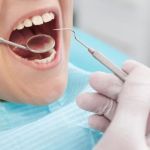Symptoms of an Abscessed Tooth and How to Treat It
- 1. Understanding an Abscessed Tooth
- 2. Common Symptoms of an Abscessed Tooth
- 3. Steps to Treat an Abscessed Tooth
- 4. When to Seek Professional Treatment
- 5. Preventing an Abscessed Tooth
- 6. Buying Guide for Oral Care Products
1. Understanding an Abscessed Tooth
An abscessed tooth is a serious dental condition where a pocket of pus forms around the root of a tooth due to a bacterial infection. This infection can result from untreated cavities, gum disease, or dental trauma, leading to severe pain and other symptoms. An abscess can spread to other areas of the body if left untreated, making it important to recognize the signs early and seek treatment.
While the pain associated with an abscessed tooth can be excruciating, understanding the underlying causes and symptoms can help you take appropriate steps to treat it effectively.
2. Common Symptoms of an Abscessed Tooth
If you suspect you have an abscessed tooth, it's important to recognize the symptoms. Some common signs include:
- Severe Toothache: The pain from an abscessed tooth is often intense, throbbing, and persistent. It may worsen when chewing or touching the affected tooth.
- Swollen Gums: The gums around the affected tooth may be swollen, red, and painful. You may also notice a bump or pimple-like abscess on the gums.
- Bad Taste or Odor: The infection can lead to a foul taste or smell in the mouth, often caused by pus draining from the abscess.
- Fever: In some cases, a fever may develop as the body attempts to fight the infection.
- Sensitivity to Temperature: You might experience heightened sensitivity to hot or cold foods and drinks.
If you experience any of these symptoms, it is crucial to consult a dentist promptly to prevent further complications.
3. Steps to Treat an Abscessed Tooth
Treating an abscessed tooth requires both home care and professional dental intervention. Here's what you can do:
- Step 1: Pain Relief: Over-the-counter pain relievers like ibuprofen can help alleviate pain and reduce inflammation. Applying a cold compress to the outside of your cheek may also help.
- Step 2: Rinse with Salt Water: Rinsing your mouth with warm salt water can help clean the area and reduce bacteria around the abscess.
- Step 3: Antibiotics: Your dentist may prescribe antibiotics to help treat the infection and prevent it from spreading.
- Step 4: Root Canal or Tooth Extraction: In most cases, the dentist will perform a root canal to remove the infection and save the tooth. In more severe cases, tooth extraction may be necessary.
It's important to seek professional treatment as soon as possible to avoid complications and preserve your oral health.
4. When to Seek Professional Treatment
If you notice any of the symptoms of an abscessed tooth, it's vital to visit a dentist as soon as possible. Delaying treatment can lead to further complications, including the spread of infection to other parts of the body. If you experience difficulty swallowing, breathing problems, or if the swelling rapidly increases, seek emergency dental care immediately.
5. Preventing an Abscessed Tooth
Prevention is always better than treatment. To reduce the risk of developing an abscessed tooth:
- Maintain Good Oral Hygiene: Brush your teeth twice a day and floss regularly to remove plaque and bacteria that can lead to infections.
- Regular Dental Visits: Visit your dentist every six months for checkups and cleanings. Early detection of cavities and gum disease can prevent abscesses from forming.
- Avoid Sugary Foods: Limit your intake of sugary foods and drinks, which can contribute to tooth decay and infections.
By following these simple steps, you can significantly reduce your chances of developing an abscessed tooth.
6. Buying Guide for Oral Care Products
If you're looking to protect your teeth from abscesses and other dental problems, investing in the right oral care products is essential. From toothbrushes and floss to mouthwashes, there are several products that can help you maintain a healthy mouth. Visit Dentistry Toothtruth for expert recommendations on the best oral care products to keep your teeth clean and healthy.
Take proactive steps in caring for your teeth and avoid the pain and complications of an abscessed tooth. Click here to explore top-rated oral care products and find the right solutions for your oral health.







 Cumming Dental Implant Center5.0 (1 review)
Cumming Dental Implant Center5.0 (1 review) Thai & Kiourtsis Orthodontics5.0 (66 review)
Thai & Kiourtsis Orthodontics5.0 (66 review) The Smilist Dental Syosset4.0 (354 review)
The Smilist Dental Syosset4.0 (354 review) Cottonwood Heights Dentistry4.0 (24 review)
Cottonwood Heights Dentistry4.0 (24 review) Sterling Rogers, DDS4.0 (35 review)
Sterling Rogers, DDS4.0 (35 review) Aurora Family Dental4.0 (24 review)
Aurora Family Dental4.0 (24 review) The Importance of Oral Health Education During Pregnancy for a Healthy Pregnancy
The Importance of Oral Health Education During Pregnancy for a Healthy Pregnancy Best Tips for Brushing Your Teeth Properly for Healthy Gums: Essential Techniques for Oral Health
Best Tips for Brushing Your Teeth Properly for Healthy Gums: Essential Techniques for Oral Health Why Skipping Dental Checkups Can Lead to Bigger Oral Health Problems
Why Skipping Dental Checkups Can Lead to Bigger Oral Health Problems Advantages of Porcelain Dental Restorations
Advantages of Porcelain Dental Restorations How Can Diabetes Cause Tooth and Gum Problems? Preventing and Managing Oral Health Issues
How Can Diabetes Cause Tooth and Gum Problems? Preventing and Managing Oral Health Issues Healthy Habits for Promoting Good Oral Health and Hygiene: Tips for a Healthy Smile
Healthy Habits for Promoting Good Oral Health and Hygiene: Tips for a Healthy Smile